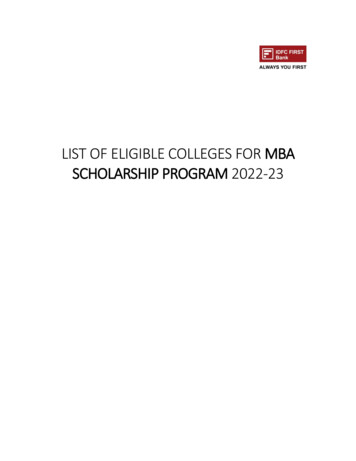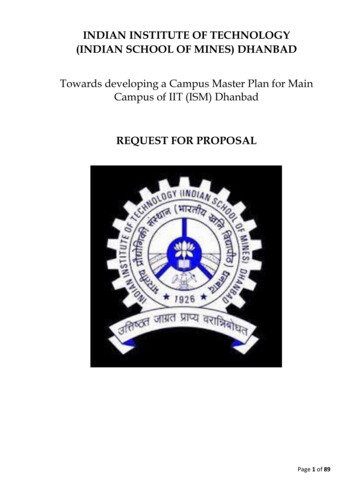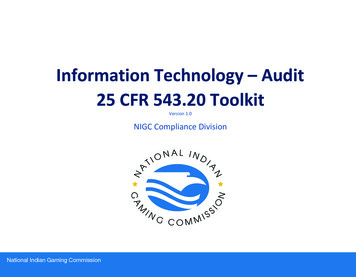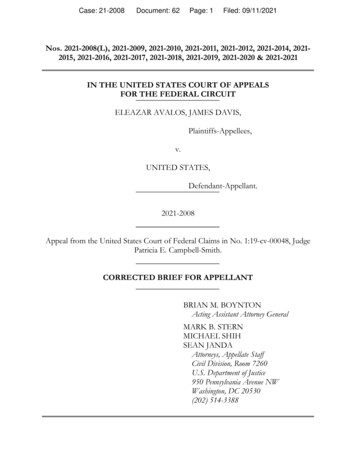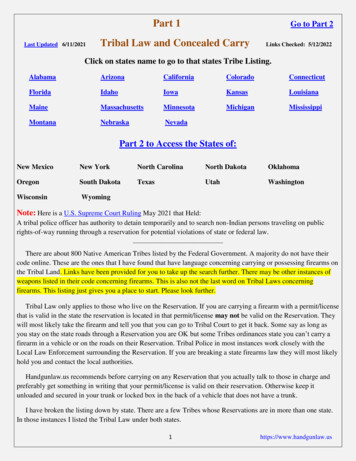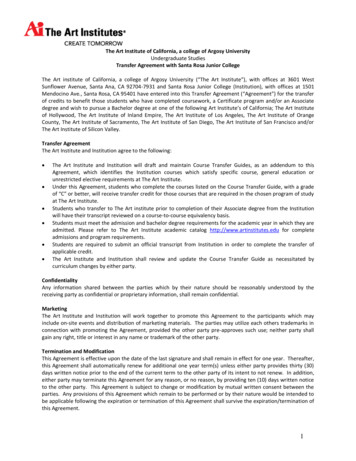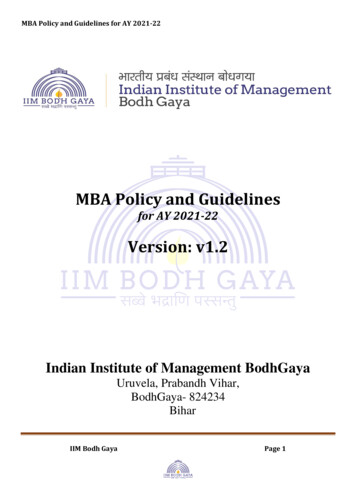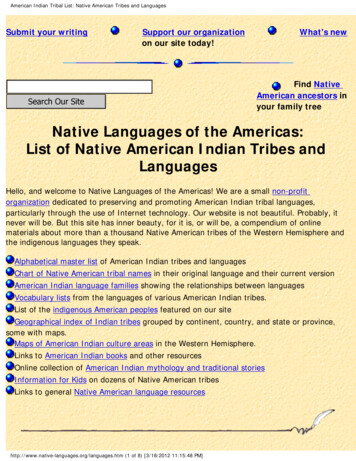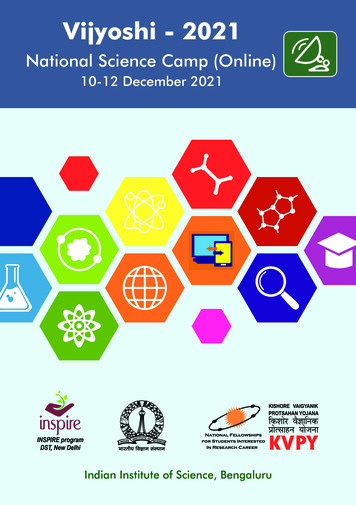
Transcription
Vijyoshi - 2021National Science Camp (Online)10-12 December 2021Indian Institute of Science, Bengaluru
FUNDED BYDepartment of Science and TechnologyGovernment of IndiaORGANISERSINSPIRE Program, Government of India
NATIONAL SCIENCE (VIJYOSHI) CAMP - 202110 - 12 December 2021The aim of the annual National Science (Vijyoshi) Camps isto provide a forum for interactions between bright youngstudents and leading researchers in various branches of scienceand mathematics. With boundaries between disciplines fastdisappearing, these camps serve as an ideal platform forthe young participants to get an exciting global viewpointof questions relating to basic sciences as well as applicationoriented themes.As in the previous meetings, a comprehensive programmehas been designed for the participants. This includes thoughtprovoking lectures (in the form of online webinars) followedby a round of discussion at the end of each lecture. Apartfrom all this, the previous meetings have ultimately servedto motivate and inspire the participants by bringing themtogether, in what is hoped will be their first step towards acareer in research in the basic sciences and mathematics.Prof. A K NandakumaranConvenerKishore Vaigyanik Protsahan YojanaIndian Institute of ScienceBengaluru – 560 012A Program of Department of Science and Technology,Govt. of IndiaOrganised byKISHORE VAIGYANIK PROTSAHAN YOJANAandINSPIRE PROGRAM1
December 10th 2021 (Online)09.30 – 10.00Inauguration09.30 – 09.35Welcome addressProf. A K Nandakumaran, Convener, KVPY09.35 – 09.55Inaugural addressProf. Govindan RangarajanDirectorIndian Institute of Science, Bengaluru09.55 – 10.00Vote of ThanksProf. Vishwesha GuttalCoffee Break10.30 - 12.00Lecture 1SpeakerProf. Usha VijayraghavanTitle: Codes for the making of a rice flowering stemSession ChairProf. Vishwesha GuttalLunch Break14.00 - 15.30Lecture 2SpeakerProf. Alessio FigalliTitle: The beauty of nature and the art of problem-solvingSession ChairProf. A. K. NandakumaranCoffee Break17.30 - 19.00Lecture 3SpeakerProf. Meg CrofootTitle: A Science of the Sociome: Tracking how individual interactionsscale to complex societiesSession ChairProf. Vishwesha Guttal2
December 11th 2021 (Online)10.30 - 12.00Lecture 4SpeakerProf. Uday MaitraTitle: Learning Chemistry through simple ExperimentsSession ChairProf. Santanu MukherjeeLunch Break16.30 - 18.00Lecture 5SpeakerProf. Rohini GodboleTitle: Unravelling Secrets of Nature: From Rutherford to LHCSession ChairProf. Abha MisraCoffee Break18.30 – 20.00Lecture 6SpeakerProf. Ken OnoTitle: Why does Ramanujan, “The Man Who Knew Infinity”, matter?Session ChairProf. Thirupathi Gudi3
December 12th 2021 (Online)17.00 - 18.00Interactive Feedback SessionSession ChairProf. Abha MisraCoffee Break18.30 - 20.00Lecture 7SpeakerProf. Ryan ShenviTitle: Mistakes in a Good Direction: Creativity in ScienceSession ChairProf. Santanu Mukherjee20.00 – 20.15Concluding RemarksProf. Thirupathi Gudi4
Lecture 1Codes for the Making of A Rice Flowering StemProf Usha VijayaraghvanAbstract: When and how flowers are made on the body of an adult flowering plantis fascinating question that has intrigued scientists and philosophers for millennia.In recent years developmental genetics in some model plants illustrated how a fewkey ‘master’ regulators can have large- cascading- and cumulative- effects on generegulatory networks that control flowering stem and floral organs patterns. I willdiscuss how evolutionarily conserved roles and species-specific innovations togetherinfluence diversity in flowering time and in floral architectures.Biography: Prof. Usha Vijayraghavan obtained her Ph.D. in 1989 from CaliforniaInstitute of Technology, Pasadena, U.S.A. in yeast genetics and did her post-doctoralresearch Caltech with Prof. Elliot Meyerowitz where she began work on transcriptionfactors that regulate plant development. She is currently Dean, Division of BiologicalSciences at Indian Institute of Science, Bangalore, India and Professor in Departmentof MCB. Her work has been recognized several awards some of which are the HarSwarup Medal of the Indian National Science Academy, The National BioscienceAward of the DBT and the C. V. Raman award of the Karnataka State Science andTechnology Council. She is an elected fellow of Indian National Science Academy,Indian Academy of Sciences, has held the JC Bose Fellowship.5
Lecture 2The Beauty of Nature and the Art of Problem-SolvingProf. Alessio FigalliAbstract: Although often not emphasized, mathematics is a discipline based oncreativity. Thanks to this creativity, mathematicians derive models and formulas thatallow them to describe and ultimately understand nature. In this talk, I will try toshow the beauty and importance of mathematics by explaining the theory of optimaltransport and its relation to various problems. ETH Zürich - Giulia MarthalerBiography: Alessio Figalli earned his doctorate in 2007 under the supervision of LuigiAmbrosio at the Scuola Normale Superiore di Pisa and Cédric Villani at the ÉcoleNormale Supérieure de Lyon. He was a faculty at the University of Texas-Austin,before moving to ETH Zürich in 2016 as a chaired professor. Since 2019 he is thedirector of the “FIM-Institute for Mathematical Research” at ETH Zürich.Figalli has won an EMS Prize in 2012, the Peccot-Vimont Prize 2011, the Peccot 2012of the Collège de France, the 2015 edition of the Stampacchia Medal, and the 2017edition of the Feltrinelli Prize for mathematics, and has been appointed NachdiplomLecturer in 2014 at ETH Zürich. He was an invited speaker at the International Congressof Mathematicians 2014. In 2018 he won the Fields Medal for “his contributions tothe theory of optimal transport, and its application to partial differential equations,metric geometry, and probability”.6
Lecture 3Building A Science of the Sociome: Tracking How IndividualInteractions Scale to Complex SocietiesProf. Meg CrofootAbstract: For many animals, ecological and evolutionary success depends not onlyon the decisions of lone individuals, but also on what happens when groups ofindividuals come together and interact. To understand how animal societies emergeand function, we need a framework for quantifying variety of interactions thatcomprise the ‘sociome.’ Technological innovations—from satellite-based tracking todrones and computer vision—can generate vast quantities of data about individualbehavior in social contexts, creating new opportunities to map the relationships thatstructure animal societies. In this talk, I will discuss the analytical, experimental andtechnological methods to harness these tools of our digital age. I will illustrate howwe are using these approaches to monitor, measure and experimentally manipulatewild animal societies in ecologically and evolutionarily relevant field settings.Biography: Meg studied Human Biology at Stanford University and received herMasters (2003) and PhD (2008) in Anthropology from Harvard University. She was anAssistant Professor at University of California, Davis as an Assistant Professor (20132017) and then Associate Professor (2017-2019). Crofoot became a Director at the MaxPlanck Institute of Animal Behavior and Full Professor at the University of Konstanz in2019. In recognition of her scientific accomplishments, Meg has been honored withseveral awards including the Packard Fellowship in Science and Engineering (2016)and the Alexander von Humboldt Professorship (2018). Dr. Margaret Crofoot is abehavioral ecologist and evolutionary anthropologist interested in the evolution ofsocial complexity. She is particularly interested in how group-level traits emerge andthe ways in which they shape the collective ecology of animals’ societies.7
Lecture 4Learning Chemistry Through Simple Experiments.Prof. Uday MaitraAbstract: In many schools and colleges chemistry is often taught ‘theoretically’,without showing experiments connected with the theory being taught. Much of ourteaching processes also ignore applications of chemistry in real life. This is unfortunatesince Chemistry is essentially an experimental subject and plays an important role inour daily life. The demonstration of simple experiments to understand principles ofchemistry can make the students learn and appreciate chemistry and its applications.In this (virtual) lecture-demonstration I will try to highlight the importance of doingsimple experiments to learn a few chemistry principles with fun.Biography: After his BSc from Presidency College, Calcutta and MSc from IIT Kanpur,Uday Maitra received his M. Phil and PhD from Columbia University in 1986 workingwith Prof. Ronald Breslow. Following a postdoctoral stay at the University of Californiaat Berkeley with Prof. Paul Bartlett, he returned to India, and after a year at IITKanpur moved to IISc Bangalore in 1989. His research interests are in the Chemistryof Bile acids; Hydrogels, Metallohydrogels and Organogels; Organic-inorganic hybridmaterials; photoluminescent sensors, etc. His group has recently developed a generalstrategy for low cost, paper based photoluminescent sensors for enzymes and biorelevant small molecules. He is also greatly interested in Chemistry Education andis a regular participant in a variety of outreach programmes for high school andundergraduate students. He has received a number of awards and honours includingthe S.S. Bhatnagar Award in Chemical Sciences in 2001, and is an elected fellow ofthe Indian Academy of Sciences and the Indian National Science Academy.8
Lecture 5Unravelling Secrets of Nature: from Rutherford to LhcProf. Rohini GodboleAbstract: In this talk I want to trace the journey of physicists towards gaining anunderstanding of ‘what lies within’ beginning from Rutherford to the Large HadronCollider. Beginning from Rutherford’s classic experiment which indicated the presenceof a nucleus inside an atom, today science has reached a stage where we understandwhat lies at the heart of the matter. The discovery of the Higgs boson ten years ago atthe large Hadron Collider was one big step in arriving at this understanding. Further,this ‘inward bound journey’ has implications for different puzzles that the Universeand the Cosmos has set for us. Thus the continuing journey towards unravelling thesecrets of nature now has to proceed on the twin paths of experiments on the earthand in the sky!Biography: Prof. Rohini M. Godbole is an honorary professor at the Indian Instituteof Science, Bangalore, has spent time at various Universities in India, Europe andthe USA including CERN. She has worked extensively on the Standard Model ofParticle Physics (SM) and the physics beyond it (BSM), authoring more than 300publications. Her pioneering work on probing hadronic interactions of photons atcolliders, provided important insights for the designs of electron-positron colliders.She is an elected fellow of all the three science academies of India as well as TheWorld Academy of Science (TWAS). She is a recipient of Padmashree award fromGovernment of India and the ’Ordre National du Merite’ by the French Government.She has worked in a number of fora to facilitate participation of women in science.This includes bringing out a book “Lilavati’s Daughter”, containing autobiographicalsketches of Indian women scientists as well as leading surveys to determine whywomen drop out of science after doing a Ph.D.9
Lecture 6Why Does Ramanujan, “The Man Who Knew Infinity”,Matter?Prof. Ken OnoAbstract: This lecture is about Srinivasa Ramanujan, “The Man Who Knew Infinity.”Ramanujan was a self-trained two-time college dropout who left behind 3 notebooksfilled with equations that mathematicians are still trying to figure out today. Heclaimed that his ideas came to him as visions from an Indian goddess. This lecturegives many reasons why Ramanujan matters today. The answers extend far beyondhis legacy in science and mathematics. The speaker was an Associate Producer ofthe film “The Man Who Knew Infinity” (starring Dev Patel and Jeremy Irons) aboutRamanujan. He will share several clips from the film in the lecture, and will also tellstories about the production and promotion of the film.Biography: Ken Ono is the Thomas Jefferson Professor of Mathematics at theUniversity of Virginia and the Vice President of the American Mathematical Society.He earned his PhD from UCLA in 1993, and he has published several monographs andover 200 research and popular articles in number theory, combinatorics and algebra.Professor Ono has received many awards for his research, including a GuggenheimFellowship, a Packard Fellowship and a Sloan Fellowship. He was awarded aPresidential Early Career Award for Science and Engineering (PECASE) by Bill Clintonin 2000 and he was named the National Science Foundation’s Distinguished TeachingScholar in 2005. He was also an associate producer of the 2016 Hollywood film “TheMan Who Knew Infinity,” which starred Jeremy Irons and Dev Patel.10
Lecture 7Mistakes in a Good Direction: Creativity in ScienceProf. Ryan ShenviAbstract: Science does not advance by flashes of truth, Eureka moments. Instead,science is the hard and humbling process of proving your ideas wrong over andover unto infinity. This talk will explore the scientific process, a healthy mindset foranswering questions in science and a few examples.Biosketch: Ryan Shenvi is a Professor in the Department of Chemistry at The ScrippsResearch Institute. He was born in 1981 in Wilmington, DE. He obtained his B.S. degreefrom Penn State University and earned his Ph.D. working with Prof. Phil S. Baran atThe Scripps Research Institute as an NDSEG predoctoral fellow. After postdoctoralstudies with Prof. E. J. Corey at Harvard University as an NIH postdoctoral fellow, Ryanreturned to Scripps to start his own lab in 2010 and was tenured in 2014. He becamea professor in 2019. Ryan’s lab develops new chemical reactions to access complexorganic molecules that change the state and fate of mammalian cells.Ryan has received many awards and recognitions including Eli Lilly New Faculty Award(2011), NSF Career Award (2014), Novartis Early Career Award (2014), TetrahedronYoung Investigator Award (2019) and Elias J. Corey Award for Outstanding OriginalContribution in Organic Synthesis by a Young Investigator (by the American ChemicalSociety) (2021).11
Notes12
Notes13
kvpy.iisc.ac.in
Why Does Ramanujan, "The Man Who Knew Infinity", Matter? Prof. Ken Ono Abstract: This lecture is about Srinivasa Ramanujan, "The Man Who Knew Infinity." Ramanujan was a self-trained two-time college dropout who left behind 3 notebooks filled with equations that mathematicians are still trying to figure out today. He
